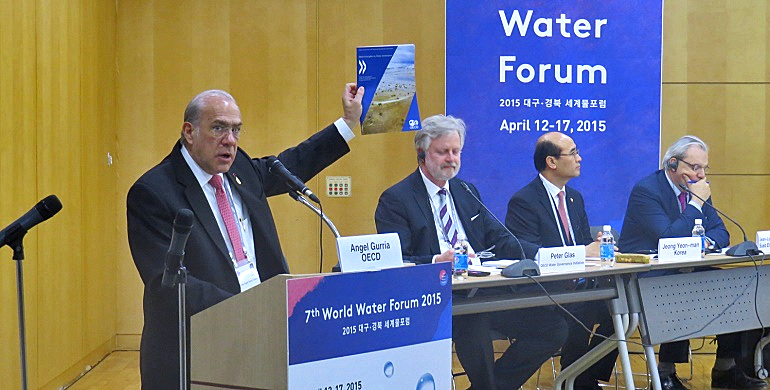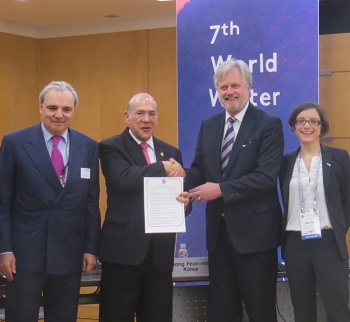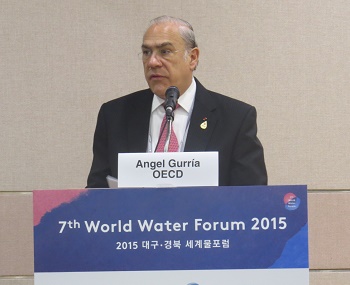WWF7: OECD launches 12 principles to achieve more stable water policies
 Chair of the OECD Water Governance Initiative, Peter Glas, handed over the Daegu multi-stakeholder declaration on 12 principles for more effective water governance to secretary-general Angel Gurria of the OECD.
Chair of the OECD Water Governance Initiative, Peter Glas, handed over the Daegu multi-stakeholder declaration on 12 principles for more effective water governance to secretary-general Angel Gurria of the OECD.
The handing over took place at the World Water Forum in Daegu, Korea on 13 April.
Formal and informal water policymaking
At the previous World Water Forum in Marseille in 2012, the Organisation for Economic Cooperation and Development (OECD) took the initiative to develop a set of principles on water governance. The initiative addresses the whole, both formal and informal, process of water policymaking.
A special steering committee, chaired by the president of the Dutch Water Authorities, Peter Glas, worked on the principles for three years.
The draft version was presented at a special session during the 7th World Water Forum. The final version is officially to be adopted by the OECD in Paris in June.
 Chair of the steering committe on water governance, Peter Glas (right), hands over the Daegu multi-stakeholder declaration to OECD secretary general Angel Gurria (left).
Chair of the steering committe on water governance, Peter Glas (right), hands over the Daegu multi-stakeholder declaration to OECD secretary general Angel Gurria (left).
More effective and efficient solutions
During the session OECD secretary general Angel Gurria said the principles have been developed to address governmental bottle necks. “Water issues are local and we have diagnosed that too often governance stands in the way of effective and efficient solutions. We hope that these principles will create a more common framework and make governance more fit for the future”, Gurria advocated.
Stable and transparent water governance will lead to clear targets and will eventually attract investors, Gurria added.
Less fragmentation
In preparation of the principles the OECD studied water reforms in 5 different countries. According to Gurria these studies learned there is much room for improvement. Especially by countering the fragmentation of national water authorities and institutes. Gurria specially referred to the in-depth study of the Dutch water governance in 2014. “The Dutch water authorities aim to reduce their water costs with 750 million euro by 2020. For this they agreed to reallocate their responsibilities and work more closely together. If there is still room for improvements in the Netherlands, there must surely be room for improvements anywhere”, Gurria said.
 OECD secretary general Angel Gurria said the 12 prinicples are to foster water governance worldwide.
OECD secretary general Angel Gurria said the 12 prinicples are to foster water governance worldwide.
Involvement of citizens
President Peter Glas of the Dutch Water Authorities emphasised that the principles are a general framework and it is up to the local stakeholders to continue their own process of water policymaking. “The trend is to broaden the engagement and involve all stakeholders. This is becoming more important as it will increase the willingness to pay for water services”, Glas said. He especially advocated to involve citizens. “In order to get more grip on the urban water issues, it is crucial to engage communities. Better access to information can be one way to achieve this.” According to Glas there is no blue print. “Every community will do it in its own way.”
Director general Jean-Louis Chaussade of Suez Environnement underlined this when he mentioned the three important lessons on water governance by his company. “All situations are different and solutions have to be tailor-made. Secondly we learned that the solutions cannot be technical only. There is also a social and political aspect. Thirdly we learned it is important to have all stakeholders on board. A contract with a local municipality is not sufficient. If we want our company to be recognized for our water services, we need to involve the local non-governmental organisations and the citizens too”, Chaussade admitted.
Read also on this website
● WWF7: Buzzing Dutch delegation very active at World Water Forum in Korea, 21 April 2015
● WWF7: Be prepared for water-related disasters was key message Dutch delegation, 20 April 2015
● WWF7: Time for long term action plans as rare weather events become regular, 20 April 2015
● WWF7: Icomos recommends water heritage as inspiration for today's water management, 19 April 2015
● WWF7: Akvo Flow hits one million mark for field surveys, 18 April 2015
● WWF7: Global monitoring water quality: top down or bottom up?, 15 April 2015
● WWF7: Dutch minister Schultz urges for consistent water policies to bring in the private sector, 15 April 2015
● WWF7: K-Water and Deltares sign MoU on joint projects on integrated water management, 14 April 2015
● WWF7: Korea and Netherlands take occasion of world forum to intensify cooperation, 13 April 2015
● WWF7: Strong Dutch delegation joins World Water Forum with positive message: Be prepared, 9 April 2015
● Special website on Dutch participation at WWF7: www.wwf7.dutchwatersector.com
More information
www.worldwaterforum7.org



